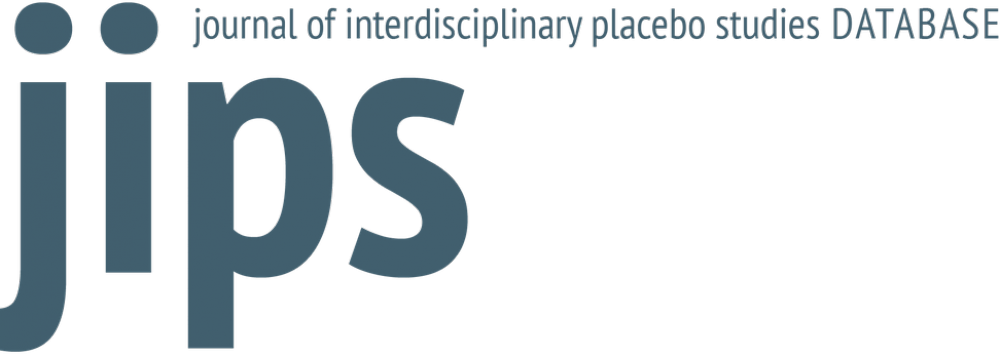Today we present 24 new placebo research papers, comments and abstracts identified during February 2018. As usual, they are based on new PUBMED publication using the search terms „placebo“ and „nocebo“ and are hand-selected from more than 727 new publications during the preceding month. Previously published monthly updates can be found in our archive. Todays selection as well as all previously identified papers will also go into our placebo research library that currently contains more than 3,500 relevant papers. If you would like to get access to the full database, please register for our newsletter and provide us with your email address and affiliation.
Ballard, E. D., Yarrington, J. S., Farmer, C. A., Lener, M. S., Kadriu, B., Lally, N., Williams, D., Machado-Vieira, R., Niciu, M. J., Park, L., & Zarate Jr., C. A. (2018).
Parsing the heterogeneity of depression: An exploratory factor analysis across commonly used depression rating scales. J Affect Disord, 231, 51-57. doi:10.1016/j.jad.2018.01.027
https://www.ncbi.nlm.nih.gov/pubmed/29448238
Borghi, C., & Veronesi, M. (2018).
Cough and ACE Inhibitors: The Truth Beyond Placebo. Clin Pharmacol Ther. doi:10.1002/cpt.1040
<https://www.ncbi.nlm.nih.gov/pubmed/29468656
Bräscher, A.-K., Witthöft, M., & Becker, S. (2018).
The Underestimated Significance of Conditioning in Placebo Hypoalgesia and Nocebo Hyperalgesia. Pain Research and Management, 2018, 1-8. doi:10.1155/2018/6841985
https://doi.org/10.1155/2018/6841985
Chhetri, J. K., de Souto Barreto, P., Cantet, C., Cesari, M., Coley, N., Andrieu, S., & Vellas, B. (2018).
Trajectory of the MAPT-PACC-Preclinical Alzheimer Cognitive Composite in the Placebo Group of a Randomized Control Trial: Results from the MAPT Study: Lessons for Further Trials. J Prev Alzheimers Dis, 5(1), 31-35. doi:10.14283/jpad.2017.21
https://www.ncbi.nlm.nih.gov/pubmed/29405230
Cohen, A., Plonsky-Toder, M., & Tirosh, E. (2018).
The Short-Term Placebo Response in Children With Attention-Deficit Hyperactivity Disorder (ADHD). J Child Neurol, 883073818756403. doi:10.1177/0883073818756403
https://www.ncbi.nlm.nih.gov/pubmed/29451082
Fralick, M., Avorn, J., Franklin, J. M., Abdurrob, A., & Kesselheim, A. S. (2018).
Application and impact of run-in studies. J Gen Intern Med. doi:10.1007/s11606-018-4344-7
https://www.ncbi.nlm.nih.gov/pubmed/29450684
Hall, K. T., Loscalzo, J., & Kaptchuk, T. (2018).
Pharmacogenomics and the Placebo Response. ACS Chem Neurosci. doi:10.1021/acschemneuro.8b00078
https://www.ncbi.nlm.nih.gov/pubmed/29498823
Hoenemeyer, T. W., Kaptchuk, T. J., Mehta, T. S., & Fontaine, K. R. (2018).
Open-Label Placebo Treatment for Cancer-Related Fatigue: A Randomized-Controlled Clinical Trial. Sci Rep, 8(1), 2784. doi:10.1038/s41598-018-20993-y
https://www.ncbi.nlm.nih.gov/pubmed/29426869
Hofler, C., Gremsl, A., & Schienle, A. (2018).
Nocebo and pseudo-neglect: Paradoxical effects detected with eye-tracking. Int J Psychophysiol, 125, 29-34. doi:10.1016/j.ijpsycho.2018.01.014
https://www.ncbi.nlm.nih.gov/pubmed/29410091
Isawa, M., Tashiro, R., Naruse, C., Yamaguchi, Y., Itoh, H., Nishimura, T., Tomi, M., Shimada, H., Saito, H., Mochizuki, M., & Nakashima, E. (2018).
Effect of serotonin transporter genotype on self-reported efficacy and activity changes of brain prefrontal area in response to placebo. Pharmazie, 73(1), 35-41. doi:10.1691/ph.2018.7740
https://www.ncbi.nlm.nih.gov/pubmed/29441949
Khan, A., Fahl Mar, K., Schilling, J., & Brown, W. A. (2018).
Does the rising placebo response impact antihypertensive clinical trial outcomes? An analysis of data from the Food and Drug Administration 1990-2016. PLoS One, 13(2), e0193043. doi:10.1371/journal.pone.0193043
https://www.ncbi.nlm.nih.gov/pubmed/29489874
Mak, D. N., Au, I. P., Chan, M., Chan, Z. Y., An, W. W., Zhang, J. H., Draper, D., & Cheung, R. T. (2018).
Placebo effect of facilitatory Kinesio tape on muscle activity and muscle strength. Physiother Theory Pract, 1-6. doi:10.1080/09593985.2018.1441936
https://www.ncbi.nlm.nih.gov/pubmed/29461139
Novack, G. D. (2018).
Compared to what? The placebo effect in dry eye therapy. Ocul Surf. doi:10.1016/j.jtos.2018.02.001
https://www.ncbi.nlm.nih.gov/pubmed/29452252
Richardson, M., Isbister, G., & Nicholson, B. (2018).
A Novel Treatment Protocol (Nocebo Hypothesis Cognitive Behavioural Therapy; NH-CBT) for Functional Neurological Symptom Disorder/Conversion Disorder: A Retrospective Consecutive Case Series. Behav Cogn Psychother, 1-7. doi:10.1017/S1352465817000832
https://www.ncbi.nlm.nih.gov/pubmed/29463338
Sauvaget, A., Bulteau, S., Guilleux, A., Leboucher, J., Pichot, A., Valriviere, P., Vanelle, J. M., Sebille-Rivain, V., & Grall-Bronnec, M. (2018).
Both active and sham low-frequency rTMS single sessions over the right DLPFC decrease cue-induced cravings among pathological gamblers seeking treatment: A randomized, double-blind, sham-controlled crossover trial. J Behav Addict, 1-11. doi:10.1556/2006.7.2018.14
https://www.ncbi.nlm.nih.gov/pubmed/29463098
Silverman, R. K., Ivanova, A., & Fine, J. (2018).
Sequential parallel comparison design with binary and time-to-event outcomes. Stat Med. doi:10.1002/sim.7635
https://www.ncbi.nlm.nih.gov/pubmed/29462838
Tetreault, P., Baliki, M. N., Baria, A. T., Bauer, W. R., Schnitzer, T. J., & Apkarian, A. V. (2018).
Inferring distinct mechanisms in the absence of subjective differences: Placebo and centrally acting analgesic underlie unique brain adaptations. Hum Brain Mapp. doi:10.1002/hbm.23999
https://www.ncbi.nlm.nih.gov/pubmed/29417694
van Bodegraven, A. A., & Boone, N. W. (2018).
Editorial: nocebo effect and switching to biosimilars. Aliment Pharmacol Ther, 47(6), 850-851. doi:10.1111/apt.14509
https://www.ncbi.nlm.nih.gov/pubmed/29446141
Van Hedger, K., Keedy, S. K., Mayo, L. M., Heilig, M., & de Wit, H. (2018).
Neural responses to cues paired with methamphetamine in healthy volunteers. Neuropsychopharmacology. doi:10.1038/s41386-017-0005-5
https://www.ncbi.nlm.nih.gov/pubmed/29463908
Wanigasekera, V., Wartolowska, K., Huggins, J. P., Duff, E. P., Vennart, W., Whitlock, M., Massat, N., Pauer, L., Rodgers, P., Hoggart, B., & Tracey, I. (2018).
Disambiguating pharmacological mechanisms from placebo in neuropathic pain using functional neuroimaging. Br J Anaesth, 120(2), 299-307. doi:10.1016/j.bja.2017.11.064
https://www.ncbi.nlm.nih.gov/pubmed/29406179
Wartolowska, K., Beard, D., & Carr, A. (2017).
Blinding in trials of interventional procedures is possible and worthwhile. F1000Res, 6, 1663. doi:10.12688/f1000research.12528.2
https://www.ncbi.nlm.nih.gov/pubmed/29259763
Webster, R. K., Weinman, J., & Rubin, G. J. (2018).
Medicine-related beliefs predict attribution of symptoms to a sham medicine: A prospective study. Br J Health Psychol. doi:10.1111/bjhp.12298
https://www.ncbi.nlm.nih.gov/pubmed/29405507
Whitehouse, W. P. (2018).
A quasi-placebo may have a role in some randomised controlled trials. Trials, 19(1), 92. doi:10.1186/s13063-018-2496-8
https://www.ncbi.nlm.nih.gov/pubmed/29409512
Zilcha-Mano, S., Roose, S. P., Brown, P. J., & Rutherford, B. R. (2018).
A Machine Learning Approach to Identifying Placebo Responders in Late-Life Depression Trials. Am J Geriatr Psychiatry. doi:10.1016/j.jagp.2018.01.001
https://www.ncbi.nlm.nih.gov/pubmed/29398354
